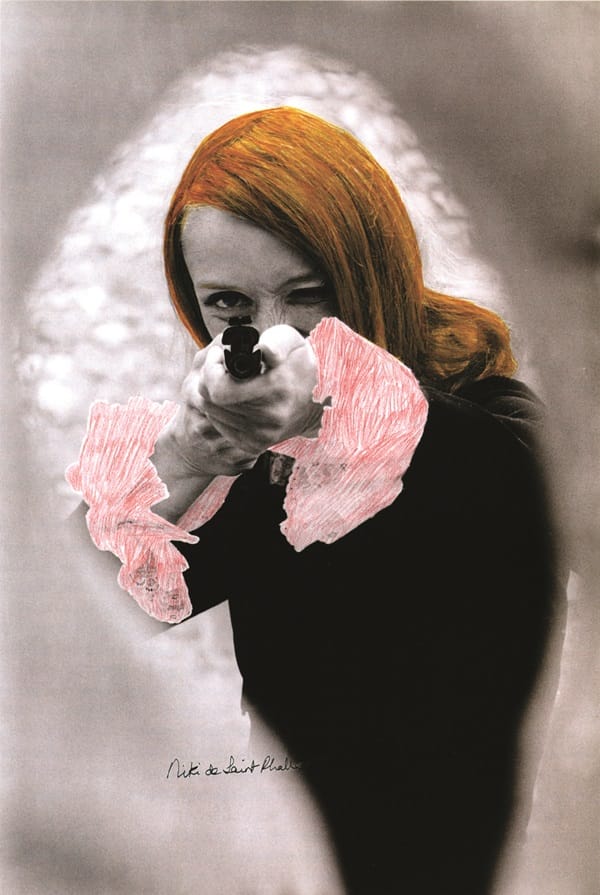
26 Jul Where are you today Niki de Saint Phalle?
Where are you today Niki de Saint Phalle?
Participants: Kalia Dimitrova and Maja Vuković
Friday, July 28, 2023, 18:30h
KROKODIL Center, Karađorđeva 43 (Male stepenice 1a)
Free entry
Language: English
Do we lack active, spatial, artistic interventionism and performance today in Serbia in response to social circumstances, the culture of violence and the culture of weapons? How important is it today for artists to take on an activist role and be the forerunners of social changes in extremely undemocratic states where violence, kitsch and crime are dominant values? Is aesthetic value stronger than ethical value? These are just some of the questions we will try to answer on Friday from 18:30 in the KROKODIL Center with Kalia Dimitrova, 126th guest of KROKODIL’s House for Writers.
Ever since the wars of the 1990s, violence in all its forms has become and remained the ultima ratio in Serbia, and as such has retained a high degree of credibility among the elected political elites, the media close to them and, indirectly, among a large part of the population. The continuation of politics through violence cannot be an argument against the general obsolescence of political practices and the impossibility of real political, economic, and social transition. The months behind us mark the time of the biggest protests in our country since October 5, 2000. Tens of thousands of people come to these peaceful and dignified protests. Every weekend they gather around a single demand: STOP the violence. The protests were initiated by the horrific massacre at Vladislav Ribnikar Elementary School, when a thirteen-year-old boy in the early morning hours of May 3 this year, took the lives of nine of his peers and a school guard. This event is the first mass murder of this type in the history of Serbia, and it can be said to be only the tip of the iceberg of violence, aggression and hatred that have been penetrating all the pores of our society for decades, and forming public awareness, education, mass and popular culture.
Artistic interventionism had one of the key historical roles in social processes, especially in raising awareness of the increase in violence, of the position of women in the patriarchy, and of fostering the culture of weapons. At the Shooting Painting American Embassy exhibition in Paris in 1961, Niki de Saint Phalle performed a radical art performance in which she tried to point out the negative consequences of the growth and nurturing of the gun culture/cult that dominated society in the United States by shooting her own paintings with a rifle. Niki de Saint Phalle, but many other artists of her generation as well, in her work, especially through performances, tried to act and respond to the violence that had been singled out and constituted as a distinct subject of her artistic reflexivity above all as a reaction to the series of assassinations in the USA (John F. Kennedy, the 35th president of the United States, was assassinated on Friday, November 22, 1963, Martin Luther King Jr. on April 4, 1968, Robert F. Kennedy in June of the same year), and, among other things, in a way also responded to the student protests in France, which served as inspiration for similar protests in many other European countries.
Do we lack active, spatial, artistic interventionism and performance today in Serbia in response to social circumstances, the culture of violence and the culture of weapons? Do we lack artistic “scandals” today that will communicate the social needs of individuals and their cry for change more strongly than any politician, as artists all over the world did during the 1960s, with the Yugoslav art scene by no means lagging behind. Where are today Niki de Saint Phalle, Shigeko Kubota, Jasmina Tešanović, Katalin Ladik, Marina Abramović, who by the means of violence against their own work and body pointed out the dangers of that very violence in a social context?
The event is realized within the project Why Do You Say Love When You Mean War?, which is supported by the Embassy of the Kingdom of the Netherlands in Belgrade. Kalia Dimitrova’s residential stay in KROKODIL’s House for Writers is supported through the Traduki program.



Sorry, the comment form is closed at this time.